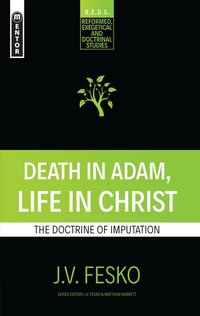 |
Death in Adam, Life in Christ:
|

What’s Death in Adam, Life in Christ About?
The Back of the Book:
The doctrine of imputation is the ground in which salvation is rooted. It centers around the three great ‘assignments’ of the Bible:
- Adam’s original sin assigned to mankind
- The sins of God’s people assigned to Chrsit
- And Christ’s righteousness assigned to all of His people.
This doctrine is often seen as superfluous or splitting hairs, and yet, without it, redemption automatically becomes reliant on our own works and assurance of salvation is suddenly not so sure.J. V. Fesko eloquently and systematically works through this doctrine, looking at its long history in the church, its exegetical foundation, and its dogmatic formulation. In exploring imputed guilt from the First Adam alongside the imputed righteousness from the Second, this volume offers a helpfully well-rounded explanation of the doctrine.
Fesko starts out by sketching the doctrine and how he’s going to approach the argument. He then discusses the history of the doctrine, how the Church has discussed this from the Early Church through to the present—this takes about half the book. Then we get two carefully structured chapters looking at Imputation in the Old and New Testaments. He wraps things up with a long chapter that brings all the data together to lay out a doctrine of Imputation that reflects the exegesis and honors the best of the history.
So, what did I think about Death in Adam, Life in Christ?
I’d been wanting to try the R.E.D.S. series for a while, but hadn’t taken the leap. When Jonathan Landry Cruse cited this in The Christian’s True Identity, I figured this was the way in. This volume speaks well for the series.
If J. V. Fesko convinces you to embrace his position on something it won’t be through soaring rhetoric, emotional ploys, or charm and wit—it’ll be because he’s right. I’m not saying that Fesko drains all the life and verve out of important and interesting topics; but if you said it, I wouldn’t argue. It’s dry, it’s careful, it’s painstaking. It’s also very good.
These are important ideas, difficult topics, and they should be talked about as if they are. This is what Fesko does.
The historical overview was helpful and informative. The exegetical chapters were great. The doctrinal chapter and conclusion? Gold. It’ll take work and perseverance, but if you want to understand this vital doctrine, I can’t think of a better way.

![]()

